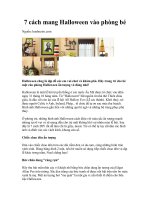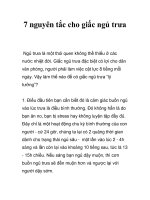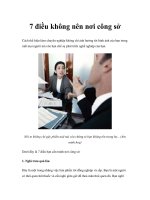Tài liệu 7 Tips for Writing Dynamic Sales Letters docx
Bạn đang xem bản rút gọn của tài liệu. Xem và tải ngay bản đầy đủ của tài liệu tại đây (59.98 KB, 2 trang )
7 Tips for Writing Dynamic
Sales Letters
Does your mind go blank when you begin writing a sales letter? Do you have
good ideas that somehow don't come together on paper? If so, you're not alone.
These are common obstacles many business owners face.
These seven tips can help you write more effective sales letters:
1. Be the customer as you write. This is the most important aspect of a good
sales letter, but it's often overlooked. Imagine yourself as the reader of your
letter, and write what the customer wants to know--not what you want to say.
You have one page to attract a customer; you'll lose the opportunity if your sole
emphasis is on your business. Remember, your customer's main concern is
fulfilling his or her needs and desires, not increasing the balance in your bank
account.
2. Organize your letter. Sales letters, just like high school term papers, need an
introduction, a body and a conclusion. In the introduction, tell why you're sending
the letter. The body is your "sales pitch," where you'll explain why your offer is
irresistible. The conclusion wraps it up by briefly bringing your points together
and asking the customer to take advantage of the offer.
3. Make it easy to read. Many sales letters are thrown away without being read
simply because they appear too complicated. Don't let this happen to you. Use
the following guidelines:
Write in a conversational style, just as you would normally speak; formal tones
are usually unnecessary in sales letters.
Use short sentences. Once you start writing more informally, you'll notice your
sentences will get shorter.
Compose short paragraphs. People like to have breaks in their reading. If it
doesn't flow smoothly and sound natural, rewrite it.
Edit and then re-edit your letter. Besides being difficult to read, misspelled words
and grammar errors destroy the credibility and effectiveness of your letter.
4. Capture your reader's attention. Headlines are not limited to ads. They can
also be used in letters to tell readers something they want to know in a bold way
that grabs their attention.
You can also use longer headlines--up to three or four sentences--to present
important information. In either case, always make the headline compelling so
customers want to read the rest of the story.
5. Get your readers interested. Involve the reader in the letter by bringing it to
life with a steady flow of interesting information. Write in an active voice.
Build on your sentences and paragraphs so the reader is encouraged to continue
reading. Every sentence needs to be interesting; a reader can become bored
quickly.
June Van Klaveren, owner of Compelling Communications, a copywriting firm in
St. Louis, recommends including a handwritten note or an arrow in a different
color ink to highlight an important fact and retain your reader's interest. "I also
include a `P.S.' at the bottom of the letter," says Van Klaveren. "You can count
on this and your headline being read because you've piqued the reader's
curiosity."
6. Make your readers want your product or service. This is best done by
answering the reader's question, What's in it for me? People are bombarded
daily with billboards, commercials and direct mail--all trying to sell something.
Your letter can stand out by not selling, but offering benefits.
People don't buy products or services, they buy the benefits derived from their
purchases. Remember, you're not selling dining room tables; you're selling a
joyous haven where families bond and friendships flourish. There's a big
distinction between the two approaches.
7. Ask your readers to take action. Potential customers won't know what you
want unless you tell them what to do next. If you want them to call you, say that
in your letter and provide your phone number. If you want them to visit your
facility, invite them to stop by and give them clear directions and specific office
hours.
It's also important to urge your readers to take action right away. The longer it
takes them to respond, the less likely it is you'll hear from them. If you're running
a promotion, offer the special for a limited time. If you only have a few units
available, be sure to state that quantities are limited. This generates urgency to
follow up on your letter.
Entrepreneur.com









